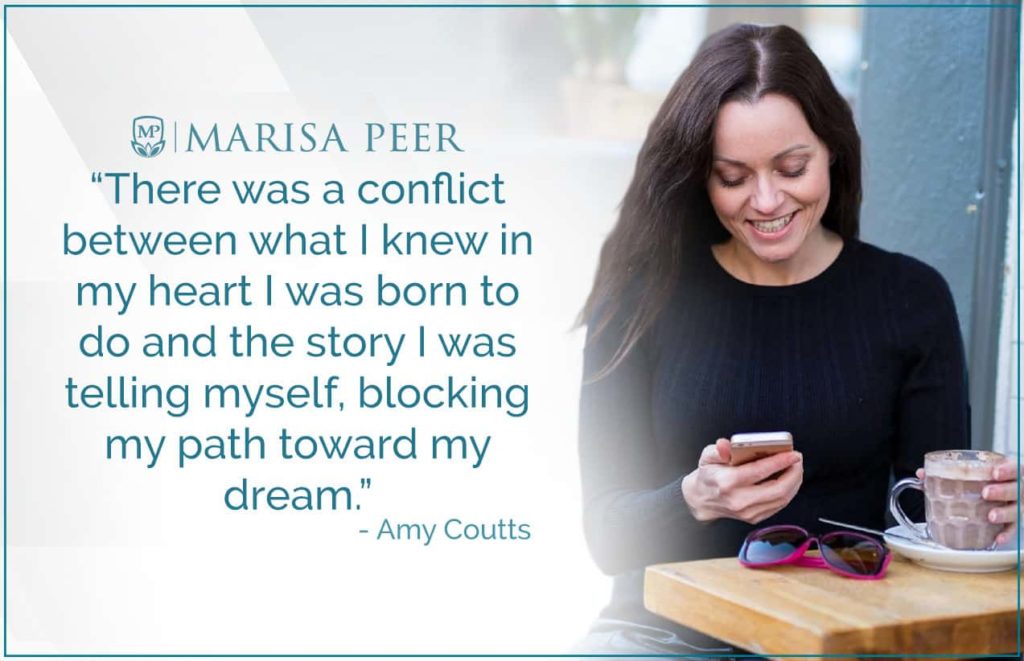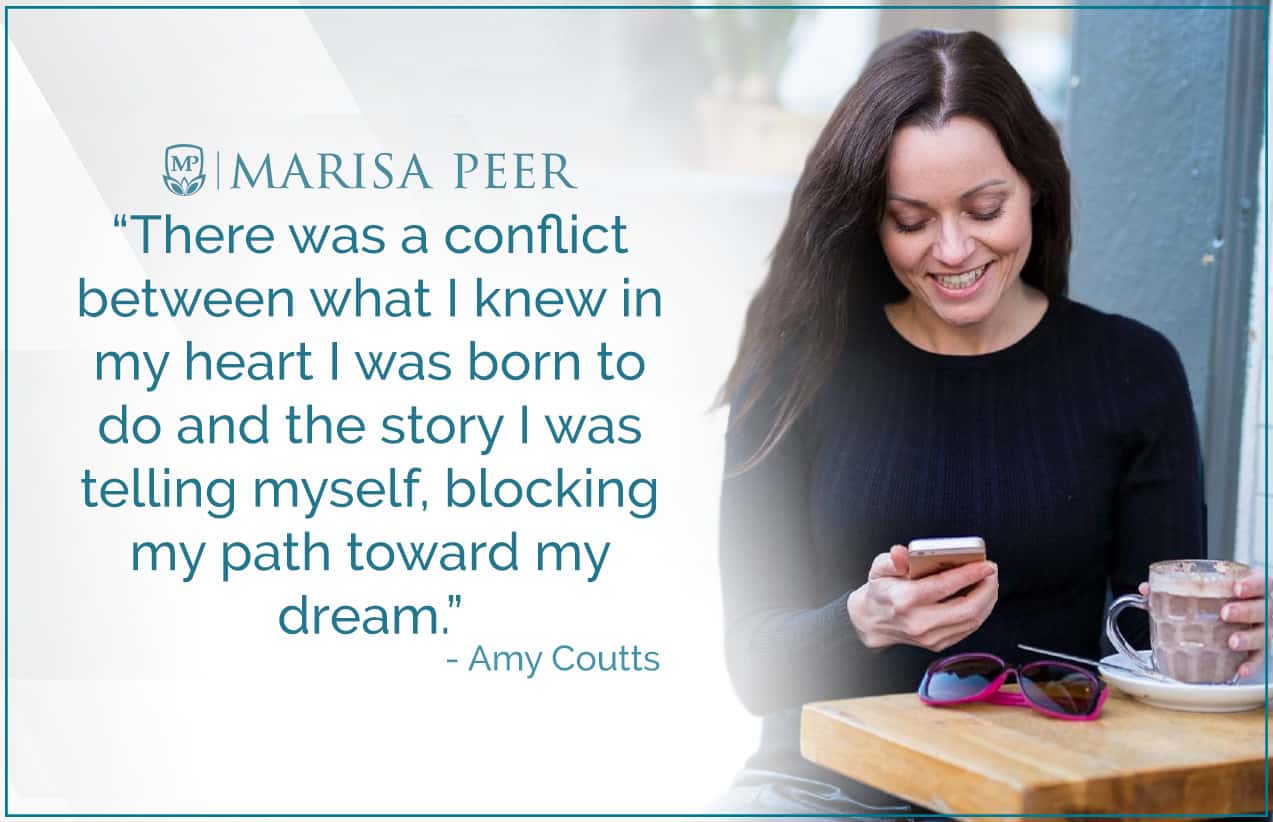Amy Coutts is a Rapid Transformational therapist, actor and teacher who aims to help clients free themselves from fear, claim their courage, rebel against rejection, and perform at their peak.
Since training with Marisa Peer and her team in London, Amy has used Rapid Transformational Therapy™ (RTT™) to overcome difficulties within her life and the performing arts. She is now highly passionate about using her skills to help fellow performers and students do the same.
Originally from Australia, Amy currently runs her practice from the UK, working both face-to-face with clients and online through Zoom video conferencing.
How has Rapid Transformational Therapy™ (RTT™) changed your life and why?
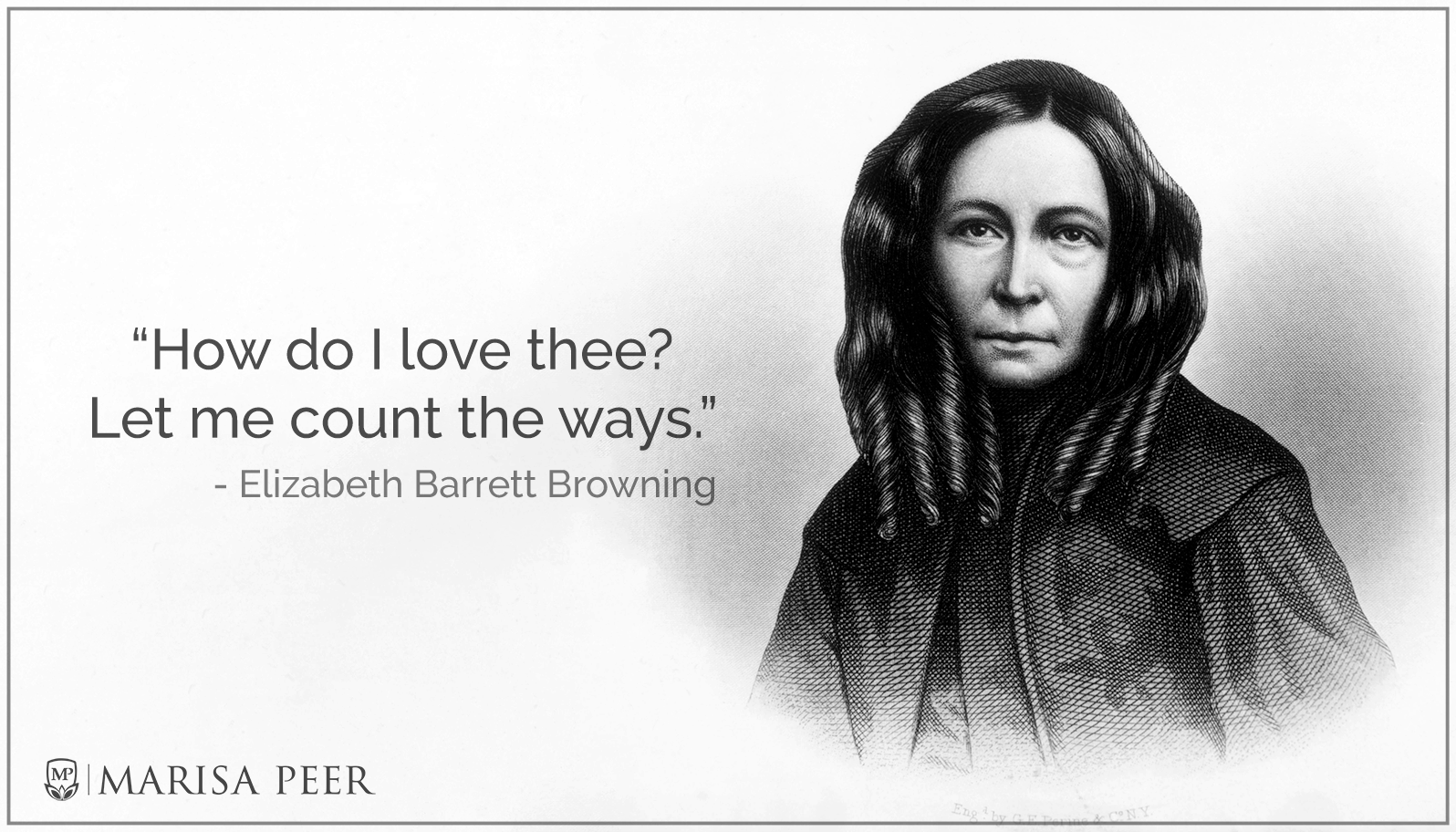
‘How do I love thee? Let me count the ways’ – Elizabeth Barrett Browning.
The above quote I feel is befitting in how my life has changed due to RTT. Today I am a woman who is far better equipped to free herself from fear, rebel against rejection, claim her courage and perform at her peak – the motto of my RTT business. I am able to do this because I live my days with the knowledge that I am truly lovable and most importantly, I AM ENOUGH. This is what Marisa Peer and RTT has allowed me to feel, be and do.
Please can you briefly summarise your life before RTT, what were your biggest challenges?
Prior to first seeing one of Marisa’s YouTube talks, I was a hormonal wreck. I had been for around a decade, suffering mostly alone except for crying over the phone to my wonderful parents or leaving panicked, hysterical voicemail messages when being strangled by the monster that is PMDD – Premenstrual Dysphoric Disorder. (I would define PMDD as PMS on steroids).
Often two weeks out of every month I would experience nearly all the symptoms associated with PMS and each month I would never be sure how it would all manifest, but mostly I felt scared, depressed and also suffered terrible migraines.
I didn’t like myself very much at all. I was in a constant recurring nightmare, constantly beating myself up, with self-sabotage, perfectionism, insecurities and resentment. I somehow felt ‘defective’ and unable to live up to the potential that I, my parents and former teachers believed I had within me.
Although I could see in the distance the life I wanted to live, I just couldn’t see how I could find a way out of the constant tsunami of emotions and toxic thought patterns and behaviour that I had been drowning in for most of my 20s. This all had an impact on my social life and personal relationships, but most of all, it was hurting my career aspirations of becoming an actor.
My hormonal mess combined with fear of judgement, rejection and chronic perfectionism meant that I would sabotage auditions, sometimes to the point of not turning up and making excuses to myself that the part wasn’t right for me anyway. I used to think that only other people could get acting jobs and be successful. I often left auditions feeling furious at myself for delivering what I thought was ‘less than perfect’, heading home in a hysterical state, crying, feeling like a failure and wanting to quit. There was a conflict between what I knew in my heart I was born to do and the story I was telling myself, blocking my path toward my dream.
How did you discover RTT and why did you decide to do it? How is RTT different from other approaches you have tried?
After a painful break up from the man I thought was my future husband, I started reflecting and soul searching about how to move my life forward. Then, by chance, I came across Marisa and her work.
I was exercising, meditating, focusing on work and spending time with friends, but there was a missing piece of the puzzle. I started listening to Marisa’s recordings and reading her books and it became clear that I had found that elusive puzzle piece. I almost studied Psychology at University, but chose Drama and Education instead. However, what I discovered through my work as an English as a Second Language (ESL) teacher, was that much of what was holding students back was confidence and mind blocks. Having participated in mindfulness practice and meditation for a couple of years, I started using this with my students. However, I wanted to push this so much further and enhance my knowledge and skills to really help the words I was telling them to sink in deeper.
When Marisa started offering her training online with the Practice Intensif, I knew that this was the next logical step for me to take in my own learning and Continuing Professional Development (CPD). I finally had my own 1:1 RTT session, with a lovely fellow RTT practitioner in Denmark, to deal with my management of PMDD. I knew that my own transformation was necessary for me to become the best RTT practitioner possible.
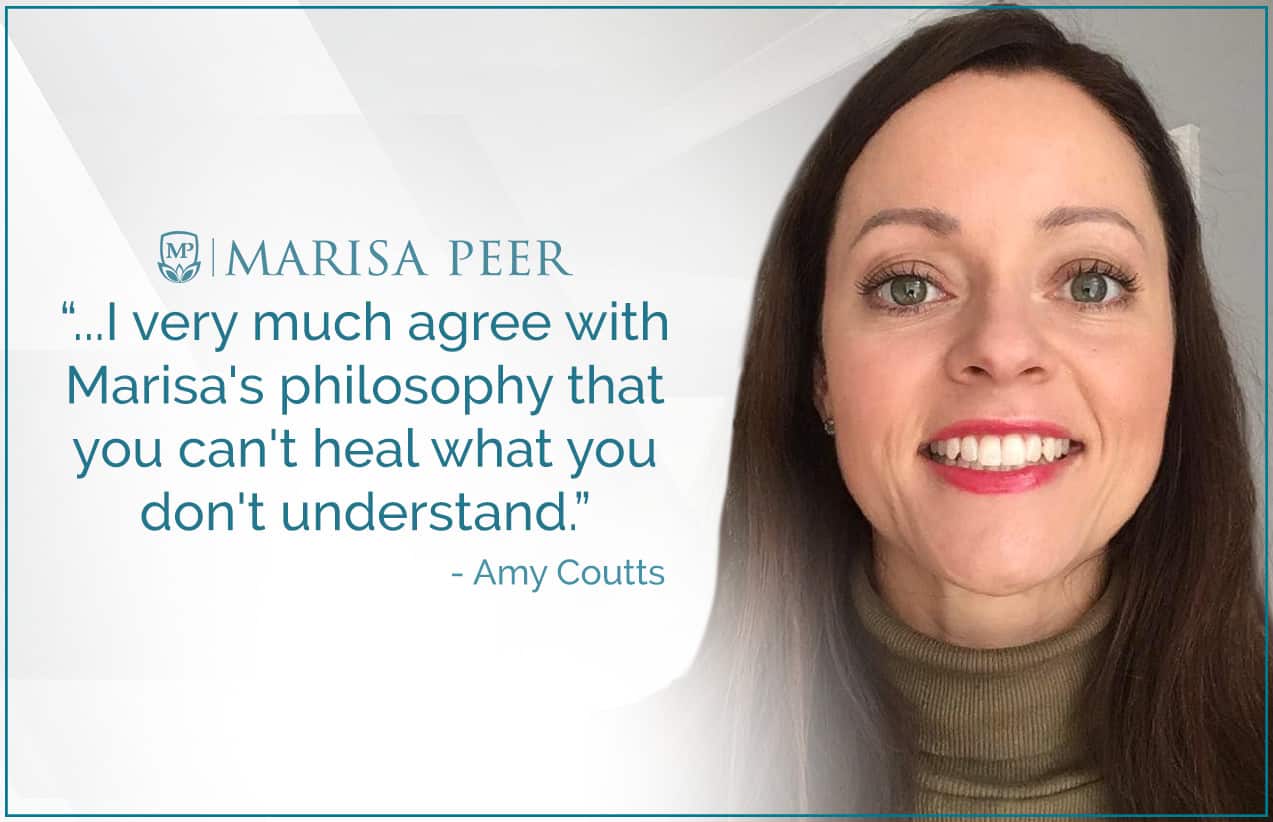
I had previously had hypnosis years earlier for my migraines, but I never got to the root causes of the issue. What I love about RTT is the root cause therapy component of the therapy, because I very much agree with Marisa’s philosophy that you can’t heal what you don’t understand. Root causes are such an important key to unlocking a person’s freedom from their issue.
What was your experience of training in RTT?
I first completed my online certification in February 2018, but it was my training on the Practice Intensif that same year that really clarified and locked in the techniques. It instilled greater confidence within me to be able to practice with clients. I met some absolutely fantastic, like-minded people that I’ve since stayed in contact with as friends.
What did you most want to achieve from RTT?
As a client, I wanted to get my symptoms under control. I also wanted to feel a sense of hope about the future again and that anything could be possible for me. As a practitioner, I want to help young adults to find their inner confidence, to rise up and reach their potential in life. Perhaps that is also the teacher in me!
I wish that I had found Marisa’s work in my twenties, but I suppose things come to us at the time that they are meant to. I especially enjoy working in creative fields and the performing arts. I like to be able to help people navigate a challenging industry, armed with phenomenal coping skills and a strong sense of self-worth, particularly in the face of rejection. I want them to value their own opinion of themselves, just as people independent of their career achievements, as opposed to the opinions of society. I want people to keep shining even in the challenging times, rather than shrinking within themselves due to fear of looking silly, ‘failing’ or as a response to external criticism. And of course, their self criticism.
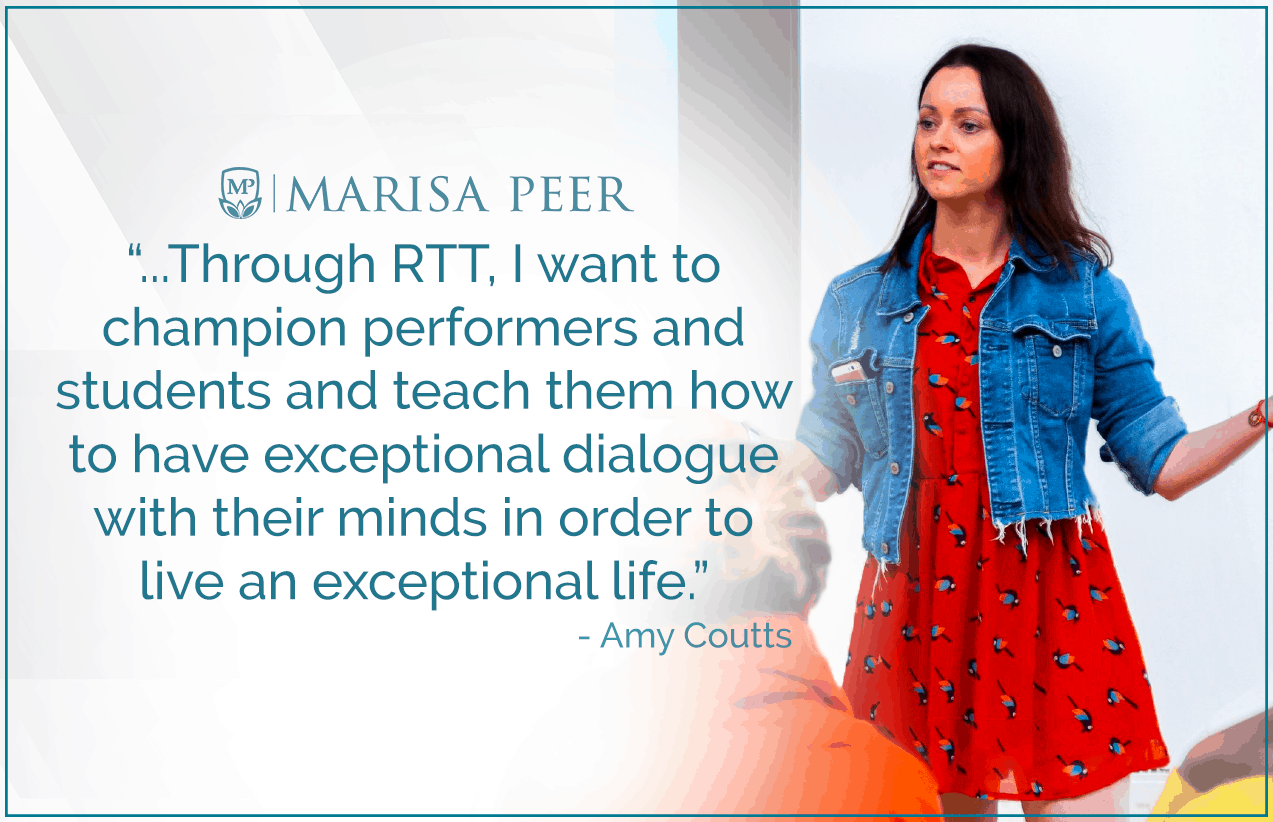
I am an ENFP which is the Campaigner from the Myer-Briggs personality test, so I guess through RTT, I want to champion performers and students and teach them how to have exceptional dialogue with their minds in order to live an exceptional life.
How has your life changed now as a result of RTT?
I think the biggest changes I’ve observed involve the way I dialogue with myself. Without any effort, I find myself feeding my mind kinder, more helpful thoughts, which is a far cry from the girl who used to mentally berate herself.
Recently I’ve been training for a half marathon. Whilst it’s hard sometimes getting out of that door, especially on a chilly morning, as I start taking those steps, I suddenly hear a little cheerleader offering me the support I need. “Wow, you’re doing great!” “You’re smashing this!” “This is so much easier than I thought it was going to be.”
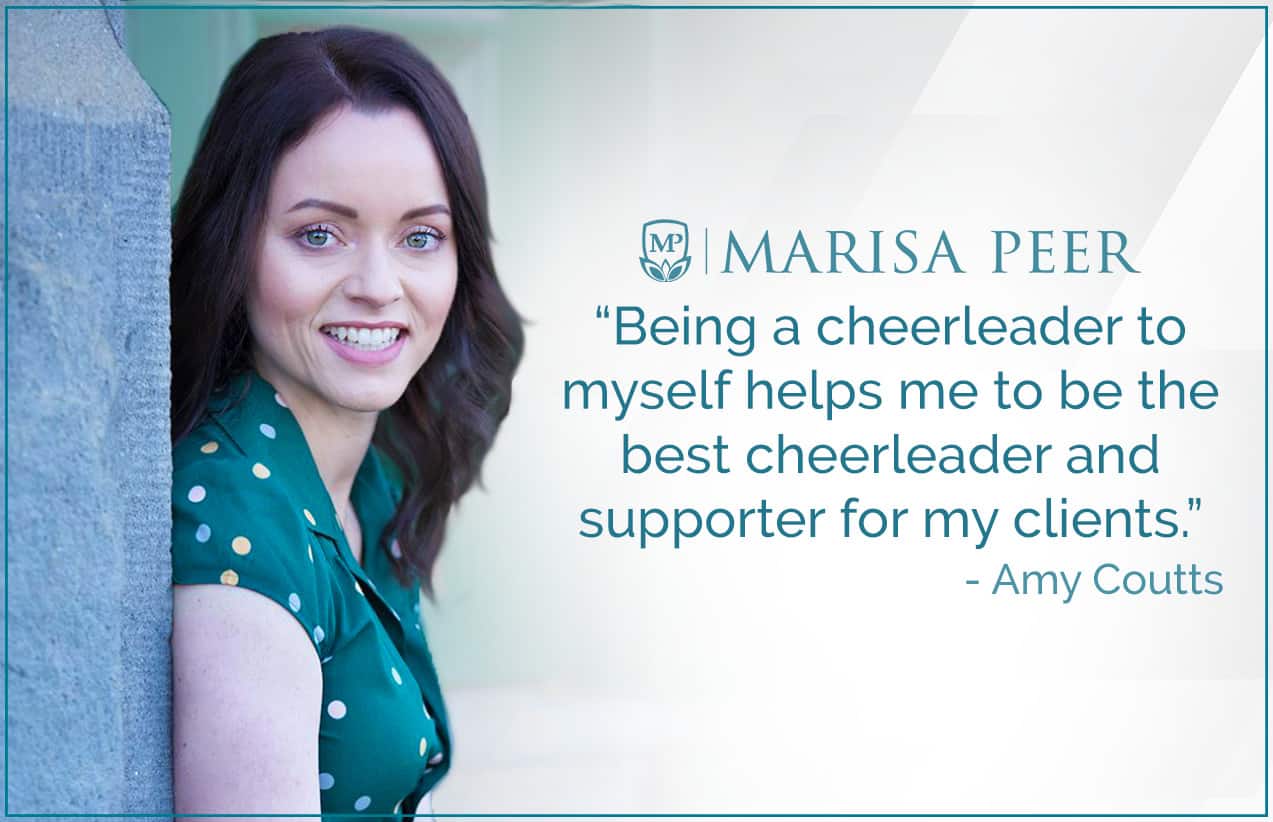
Being a cheerleader to myself helps me to be the best cheerleader and supporter for my clients. I appreciate myself so much more just for being who I am and not tying my self-worth purely to some list of achievements.
My ‘bad’ days are very few and far between now and I feel as though I am worthy of a great life with love and abundance, just in the same way I remind my clients that they too are so very worthy.
What has been your biggest impact with RTT? What are you most proud of? Is there a client story that brings this to life?
I feel lucky to be able to work to improve the lives of people as far as my homeland of Australia, Canada and even India. Technology is a truly amazing aid for this profession.
Of course I am proud of all my clients as I’m sure every RTT practitioner would be too. I suppose my proudest moment came after a session with a friend in LA who was very sceptical about the therapy at first, but gave it a try anyway. He said that the session surprised him in the sense that he felt that Adderall, which he has been taking for years, had never made him feel the same level of calm and freedom that he felt under hypnosis, so this was pleasing to hear. He thoroughly enjoyed listening to my recording too.
Anything else you would like to share?
Gratitude, gratitude, gratitude! Thank you to Marisa and her team for helping me transform and move my life forward.
Thank you Amy for sharing your experiences of RTT with the wider community and demonstrating the value of installing the cheerleader.
If you have a story to share…
We love to hear your real-life stories of how RTT has impacted you or your clients’ lives. If you would like to share your experience with the wider community, so as many people can benefit as possible, please email hollie.carr@marisapeer.com.

